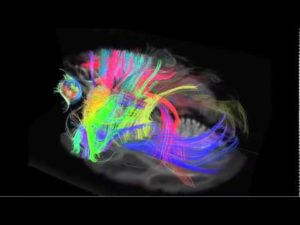 When reading the book „Etwas mehr Hirn, bitte“ (“Some more brain, please”) by German neurobiologist Prof Gerald Hüther, I felt both touched and confirmed.
When reading the book „Etwas mehr Hirn, bitte“ (“Some more brain, please”) by German neurobiologist Prof Gerald Hüther, I felt both touched and confirmed.
He shines a light on the circumstances which influence the development of our brain, especially in regard to our creative abilities – and on the consequences domestic and social norms and values represent for accessing our innate potential.
From biology we understand that our primary motivation is survival, deeply anchored in our brain stem. Charles Darwin’s thesis of “survival of the fittest” – competition as selective mechanism – is based on the need to store and use successful genetic blueprints to survive as species. So we gladly accepted competitiveness and ambition to win as a norm in society. We propagate it in our schools, our jobs, in economy, because it seems to create a meaningful structure, a hierarchy. In the field of living together and cooperation however, it often leads to never-ending conflicts as the partner is perceived as a contestant and rival in the fight for the “slice of the cake”.
Logically, this leads to specialization, which means improvement in a limited field until you have reached a place or position in which you don’t have to fear competition. In your brain, neuronal pathways and relays which support just those skills, are created and automatized – they work just like motorways for conduction, and shape our way to function and to think. Or put in other provocative words:
Competition produces nerds and social incompetence, but no happy geniuses!
Opposite to that is our innate curiosity, the joy to discover and to think, easily curbed and even choked by forced adaptation to a scheme, by imparatives and pressure. Genius is nurtured and promoted by offers, by playful occupation, by changing perspective, by recognition and trust. Only then our brain develops multiple connections between all areas, a wealthy store of tools and resources becomes accessible to create innovations and inventions. The perception of security, instead of struggle, is a prerequisite, writes professor Hüther.
In META-Health, we know an exception: individuals in which the conflict of failure, of “self-devaluations”, has been triggered in both brain hemispheres – that is in connection to both peer and hierarchic relationships, like in both family and work situations. In this constellation, our brain creates the gift of motivation “against all odds” – the so-called “megalomania”. Well-used, it facilitates to find the resources within ourselves to accomplish feats, to perform miracles – and it immunizes against social pressure and the neediness to belong that makes us impressionable and our thinking submissive.
Apparently we live in a world that inspired artists Patricio Plaza and Santiago Grasso to this video – be sure to watch it all the way to the end!
What are the implications of these insights?
… for us as teachers and inspirators for a thriving humanity, for self-healing peoples?
Especially those of us who have the “motivational constellation” can create safe rooms, sanctuaries for playful and experimental learning and discovery of our own genius. We can walk our talk, live our vision, be role models without pushing our own ideas onto the others. We can take away the fear of failure, and instead ask for the others’ thinking processes leading to different results than our own, thereby enrich our collective brain power!
 META-Health is not limited to teaching the concept of biological laws, but it allows questioning and expansion on the base of our own experiences, own thinking and open communication. When we explore and defuel our individual and collective sensitizing emotional experiences, childhood trauma and limiting beliefs, we can do our share to transform a world of slavery and wars, until the “hundredth ape” has adopted the new approach…
META-Health is not limited to teaching the concept of biological laws, but it allows questioning and expansion on the base of our own experiences, own thinking and open communication. When we explore and defuel our individual and collective sensitizing emotional experiences, childhood trauma and limiting beliefs, we can do our share to transform a world of slavery and wars, until the “hundredth ape” has adopted the new approach…
Picture sources:
[1] Screenshot of Youtube channel www.dasGehirn.info under Creative-Commons-License
[2] META-Health International CIC
El Empleo / The Employment from opusBou on Vimeo.
 META-Healthy Life articles are created by professionals and friends of META-Health International CIC, supporting individual and global health by deepening and sharing our understanding of how resilience and well-being are achieved.
META-Healthy Life articles are created by professionals and friends of META-Health International CIC, supporting individual and global health by deepening and sharing our understanding of how resilience and well-being are achieved.